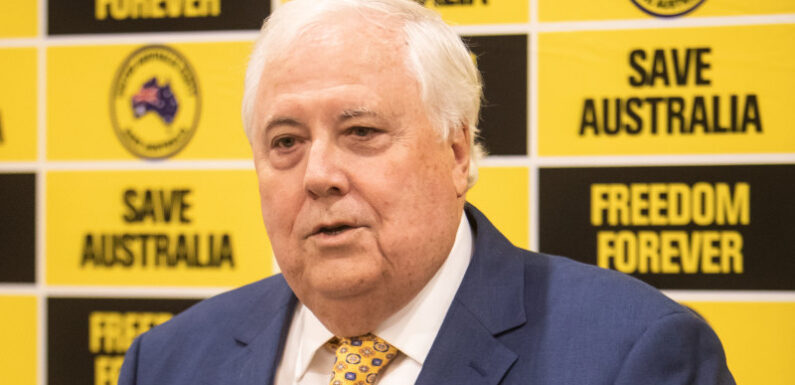
Save articles for later
Add articles to your saved list and come back to them any time.
Advertisements being bankrolled by mining magnate Clive Palmer in the final days of the referendum campaign will warn a vote for the Voice will lead to financial costs for struggling Australian families.
While Yes campaigners have feared the prospect of wealthy businesspeople such as Palmer or Gina Rinehart filling the anti-Voice movement’s coffers, Palmer appears to have refrained from throwing his financial weight behind the No case until now.
Clive Palmer has authorised a $2 million national advertising campaign to run on TV, in print and online.Credit: James Brickwood
The Yes campaign, which has received strong corporate support, has also been buoyed recently by an unexpectedly high number of small donations, leaving it with a multimillion-dollar budget less than two weeks out from the vote.
Palmer, whose United Australia Party won one Senate seat after spending $117 million at the 2022 federal election, has authorised $2 million of advertisements that state: “What comes after the Voice? The invoice”.
The wording sits over an image of a middle-aged couple who appear to be compiling a family budget.
“Don’t think you won’t be forced to ‘pay the rent’. It’s already happening in Western Australia,” the ad states. “Australia. Keep it together. Vote NO.”
Prime Minister Anthony Albanese has ruled out the prospect of paying Indigenous Australians reparations and argued that the No side raising the prospect of compensation was dishonest.
Yes campaigners have also repeatedly stated the Voice has nothing to do with reparations.
However, the No side points to pre-referendum campaign comments by leading Yes figures such as Megan Davis, who has previously said the Voice would be “inextricably linked” to a future treaty, and treaties were, among other things, about reparations for past injustices.
A United Australia Party spokesman confirmed Palmer would spend $2 million of his own money on the ads, which will run in TV, print and online across all states.
Indigenous leader Noel Pearson said on Wednesday the No side was employing the same scare tactics used during the native title debate in the 1990s.
“Watch your backyards. They’re coming for the beaches. They’re going to lock you out of national parks. All these lies are permeating across social media. I’d just say to Australians: ‘Come on. We’ve heard this all before’,” Pearson said.
The promotion’s reference to WA centres on controversial cultural heritage laws that would have imposed obligations on landholders to protect Indigenous heritage sites following Rio Tinto’s 2020 destruction of 46,000-year-old Juukan Gorge rock shelters.
The federal opposition used the contentious state laws as evidence of the onerous and expensive policies that could be sought by the Voice. The proposal was eventually scrapped by WA Labor after it acknowledged the burden it would have imposed on everyday property owners, rather than the large corporations intended.
Labor used Palmer’s high-profile campaign against WA’s COVID-19 border closure to boost support for Albanese at the last federal election, at which the Coalition lost several seats to Labor in the state.
In Perth on Wednesday, Yes23 director Dean Parkin attempted to use Palmer’s support for No to boost the Yes case in a state where support for the proposal is lower than the national average.
“It’ll be up to Western Australians to cast their judgment on whether they want to be supporting Clive Palmer, or whether they want to be supporting Cathy Freeman and Michael Long and Nathan Cleary and Kim Beazley and Ken Wyatt, people who are hugely respected in the West Australian community,” Parkin said.
A spokesman for Fair Australia declined to say whether Palmer or Rinehart had donated to the No campaign, adding it did not declare donors except as required by electoral law.
Cut through the noise of federal politics with news, views and expert analysis. Subscribers can sign up to our weekly Inside Politics newsletter.
Most Viewed in Politics
From our partners
Source: Read Full Article
